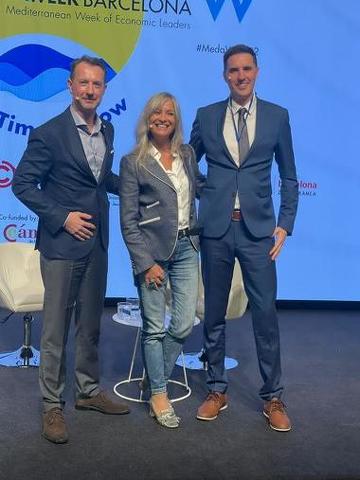The 9th Mediterranean Tourism Forum, part of The Mediterranean Week of Economic Leaders was held recently in the historic Chamber of Commerce in Barcelona. The annual event is superbly organised by ASCAME (Association of the Mediterranean Chambers of Commerce and Industry).
Thought-leading panel sessions and debates were held by tourism and hospitality decision-makers whilst addressing specifically those topics impacting the Mediterranean countries. Roger Allen, RLA Group CEO joined tourism thought leaders:
- Nikolina Brnjac, Minister of Tourism and Sport, Republic of Croatia
- Maribel Rodriguez, Senior Vice President Membership, Commercial & Events, World Travel & Tourism Council
- Joze Tomas, President The Forum of the Adriatic and Ionian Chambers of Commerce
- Eva Ballarin, Director, Hospitality Innovation Planet
- Jonathan Gomez, Director of Tourism, Malaga City Council
- Alaa Ezz, Secretary General, CEEBA
Two-panel sessions were held addressing: 'A need for change for long-term sustainability' and 'The islands, aircraft carriers of the Mediterranean tourism' with video playback found below.
A need for change for long-term sustainability - The tourism sector demonstrated how it was able to adapt to market changes and drive growth, despite persistent economic and geopolitical challenges. This session addressed tourism competition and how customers are changing. Also, recognising that Mediterranean countries need to work together, to join forces in order to compete in a global world, to bet on sustainable development capable of creating new opportunities that will allow continued growth.
The islands, aircraft carriers of the Mediterranean tourism - The islands of the Mediterranean have experienced great development in recent years, with the expansion of their tourism sector. Tourism integrates many positive elements, generates job opportunities, especially for young people and women, improves seasonal income, promotes the construction of infrastructures, develops technologies and services, and facilitates the cultural and social exchange that enriches the traveler and the destination. However, there is a big difference between growth and a fair and consistent distribution of income, and today we know that “getting back to normal” is not the way to build a prosperous and sustainable future.
The one thing we all speakers agreed on was that destination tourism success incorporates balanced and focused development objectives requiring the entire value chain to work together.
Mediterranean Tourism in Numbers
The Mediterranean is the world's leading tourism area with nearly 400 million tourists: 32% of all international arrivals and 30% of global revenues. It accounts for 13% of exports, 23% of the services sector and employs more than 20 million people. The region has 20% of the world's hotel accommodation capacity. It has 10.000 destinations, some 100.000 hotels and one million restaurants. However, despite these numbers, tourism remains heterogeneous and fragmented between the two shores of the Mediterranean.
For more information about the event please visit MedaWeek Barcelona.



